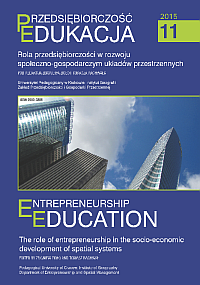Entrepreneurial competences: theoretical deliberations and their illustrations in higher education
DOI:
https://doi.org/10.24917/20833296.11.28Keywords:
entrepreneurial competences, academic education, higher education, labour market,Abstract
Entrepreneurial competences have been and are still considered the crucial factor in socio-economic development. As a significant element of social capital, these competences are key factors in creating and developing new enterprises, a successful transition into the labour market, and furthering professional careers. Several socio-psychological studies prove that, in a period of economic crisis and turbulent labour market, entrepreneurial competences are responsible for the enhancement of people’s social life activities. The literature review shows various approaches towards research into entrepreneurial competence types. Therefore, the competences, which are commonly perceived as entrepreneurial, have a very eclectic character, i.e. they are defined in a variety of ways and categorised into a variety of groups. The aim of this article is to: • Analyse various theoretical studies devoted to entrepreneurial competences/ business competences with a particular emphasis on their role in the current vision of socio-economic development; • Exemplify this “entrepreneurial competence stream” in the previously mentioned aspects within a post-Cartesian university model.References
Białasiewicz, M. (2008). Przedsiębiorczość – pożądana kompetencja. Studia i Prace Wydziału Nauk Ekonomicznych i Zarządzania Uniwersytetu Szczecińskiego, 1, 7-16.
Bielecki, P. (2011). Kompetencje absolwentów studiów wyższych w świetle ogólnoeuropejskich badań CHEERS, REFLEX i TUNNG. W: K. Jędralska, K. Bernais (red.), Kompetencje absolwentów studiów ekonomicznych. Perspektywa nauki i biznesu. Katowice: Wydawnictwo Uniwersytetu Ekonomicznego w Katowicach, 13-66.
Bird, B. (1995). Towards a theory of entrepreneurial competency. W: J.A. Katz, R.H. Brockhaus (red.), Advances in entrepreneurship, firm emergence and growth. Greenwich: CT: JAI Press, 51-72.
Błażejewski, W. (2006). Problemy rozwoju postaw przedsiębiorczych u gimnazjalistów. Przedsiębiorczość – Edukacja, 2, 242-248.
Borowiec, M., Rachwał, T. (2011). Kształtowanie postaw przedsiębiorczych na lekcjach geografii wyzwaniem edukacyjnym w procesach globalizacji. Przedsiębiorczość - Edukacja, 7, 321-332.
Boyatzis, R.E. (1982). The competent manager: a model for effective performance. London: Wiley.
Chandler, G., Hanks, S. (1994). Founder Competence, the Environment, and Venture Performance. En¬trepreneurship Theory & Practice. 18 (3), 77-89.
Erikson, T. (2002). Entrepreneurial capital: the emerging venture’s most important asset and competitive advantage. Journal of Business Venturing, 17, 275–290. DOI: 10.1016/S0883-9026(00)00062-8
Gabała, J. (2005). Kształtowanie postaw przedsiębiorczych uczniów. Przedsiębiorczość – Edukacja, 1, 145-152.
Gołębiowski, G. (2014). Przedsiębiorczość w Polsce w świetle badań Global Entrepreneurship Monitor. Studia BAS, 1(37), 9-25.
Górniak, J. (red) (2014). Kompetencje Polaków a potrzeby polskiej gospodarki. Raport podsumowujący IV edycję badań BKL z 2013 r. Warszawa: PARP.
Izquierdo, E., Deschoolmeester, D., Salazar, D. (2005). The importance of competencies for entrepreneur¬ship: A view from entrepreneurs and scholars’ perspective. Pozyskano z: http://www.espae.espol.edu. ec/images/documentos/publicaciones/documentos_trabajo/entrepreneurship/Importance.pdf (ostatni dostęp: 2014, 20 października)
Izquierdo, E., Deschoolmeester, D. (2010). What Entrepreneurial Competencies should be emphasized in Entrepreneurship and Innovation Education at the Undergraduate Level? W: A. Fayolle (red.), Handbook of Research on Entrepreneurship Education: International Perspectives, 3. Gheltenham, UK: Edward Elgar Publishing.
Jałowiecki, B. (1998). Rola uniwersytetu w rozwoju regionalnym. Zagadnienia Naukoznawstwa, 4(138).
Johannisson, B. (1993). Entrepreneurial Competence and Learning Strategies. W: R. Larsson, L. Bengtsson, K. Eneroth, A. Malm (red.), Research in Strategic Change. Lund: Lund University Press, 77-99.
Kurek, S., Rachwał, T., Szubert, M. (2012). Kształtowanie kompetencji biznesowych uczniów gimnazjum w świetle opinii nauczycieli na podstawie wyników badań prowadzonych w ramach europejskiego projektu FIFOBI, Przedsiębiorczość – Edukacja, 8, 24-36.
Lackeus, M. (2013). Developing entrepreneurial competencies. An action-based approach and classifi¬cation in entrepreneurial education. Chalmers University of Technology, Gothenburg, Sweden. Pozy¬skano z: http://vcplist.com/wp-content/uploads/2013/11/Lackeus-Licentiate-Thesis-2013-Developing- Entrepreneurial-Competencies.pdf
Lans, T., Biemans, H., Mulder, M., Verstegen, J. (2010). Self-awareness of mastery and improvability of entrepreneurial competence in small businesses in the agrifood sector. Human Resource Development Quarterly, 21(2), 147-168. DOI: 10.1002/hrdq.20041
McMillan, J., Woodruff, Ch. (2002). The central role of entrepreneurs in transition economies. Journal of Economics Perspectives, 16(3), 153-170. DOI: 10.1257/089533002760278767
Man, T., Lau, T., Chan, K.F. (2002). The competitiveness of small and medium enterprises. A conceptu¬alization with focus on entrepreneurial competencies. Journal of Business Venturing, 17(2), 123-142.
Markowska, M. (2011). Entrepreneurial Competence Development. Triggers, Processes & Consequences. JIBS Dissertation Series No. 071. Pozyskano z: http://www.diva-portal.org/smash/get/diva2:458043/ FULLTEXT02.pdf
Maxwell, J.R., Westerfield, D.L. (2002). Technological entrepreneurism: characteristics related to the adoption of innovative technology. SAM Advanced Management Journal, 67(1), 9-21.
Mikuła, B., Pietruszka-Ortyl, A. (2007). Kompetencje pracowników w perspektywie strategicznego zarządzania wiedzą w przedsiębiorstwie. Zeszyty Naukowe Akademii Ekonomicznej w Krakowie, 747, 52.
Milewska, M. (2006). Rozbudzanie postaw przedsiębiorczych wśród młodzieży wiejskiej. Przedsiębiorczość - Edukacja, 2, 249-255.
Mitchelmore, S., Rowley, J. (2010). Entrepreneurial competencies: a literature review and development agenda. International Journal of Entrepreneurial Behaviour & Research, 16(2), 92-111.
Osuch, W. (2010). Kompetencje przedmiotowe i dydaktyczne nauczycieli geografii oraz studentów geografii – kandydatów na nauczycieli. Kraków: Wyd. Naukowe UP.
Piróg, D. (2013a). Absolwenci szkół wyższych na rynku pracy w warunkach kryzysu. Przedsiębiorczość – Edukacja, 9, 302-316.
Piróg, D. (2013b). Wybrane determinanty tranzycji absolwentów studiów wyższych na rynek pracy. Dylematy współczesnego rynku pracy. Studia Ekonomiczne. Zeszyty Naukowe Wydziałowe UE w Katowicach, 160, 131-138.
Piróg, D. (2014). The impact of degree programme educational capital on the transition of graduates to the labour market. Studies in Higher Education, 1-15. DOI:10.1080/03075079.2014.914916
Rachwał, T. (2005). Kształtowanie postaw u uczniów na lekcjach podstaw przedsiębiorczości. Przedsiębiorczość – Edukacja, 1, 137-144.
Strojny, J. (2007). Kształtowanie postawy przedsiębiorczej – procesy socjalizacji i autokreacji. W: P. Wachowiak, M. Dąbrowski, B. Majewski (red.), Kształtowanie postaw przedsiębiorczych a edukacja ekonomiczna. Warszawa: FPiAKE, 205-211.
Strzebońska, A., Dobrzyńska, M. (2011). Kompetencje jako przejaw kapitału ludzkiego. W: J. Górniak (red.), Bilans kapitału ludzkiego w Polsce. Raport podsumowujący pierwszą edycję badań realizowaną w 2011 roku. Warszawa: PARP, 26-39.
Sztanderska, U., Minkiewicz, B., Bąba, M. (2005a). Absolwent na rynku pracy. Forum Akademickie, 6.
Sztanderska, U., Minkiewicz, B., Bąba, M. (2005b). Absolwent na rynku pracy. II, Forum Akademickie, 7-8.
Świłło, I. (2012). Jestem przedsiębiorczy – kształtowanie postaw przedsiębiorczych wśród młodzieży z wykorzystaniem innowacyjnych technik i narzędzi”. Prezentacja projektu. Przedsiębiorczość – Edukacja, 8, 71-77.
Downloads
Published
How to Cite
Issue
Section
License
Articles are published under the terms of the Creative Commons License (CC BY-ND 4.0; Attribution– NoDerivs).

